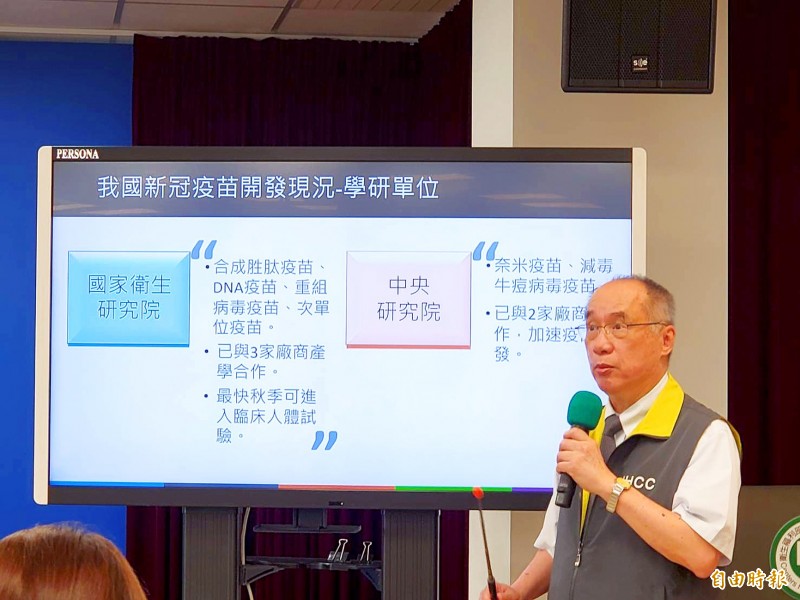《TAIPEI TIMES》Health minister preaches precautions, prevention

National Health Research Institute president Liang Kung-yee yesterday talks to reporters about research on COVID-19 vaccines during the Central Epidemic Command Center’s daily news conference in Taipei. Photo: Lin Hui-chin, Taipei Times
RESEARCH NEWS: NHRI is working with three firms on the development of four vaccines, while Academia Sinica is working with two others on two more vaccines
By Lee I-chia / Staff reporter
Research facilities and biotechnology firms are striving to develop effective vaccines or drugs against the novel coronavirus, but people must still practice the “new disease prevention lifestyle” to protect themselves, the Central Epidemic Command Center (CECC) reminded the public yesterday as it reported no new cases of COVID-19.
“As there have been no domestic cases reported for many consecutive days [52], local communities in Taiwan are relatively safe, but we still need to rely on the development of vaccines and drugs to effectively control the overall situation,” Minister of Health and Welfare Chen Shih-chung (陳時中), who heads the center, said at the center’s daily news conference in Taipei.
Eight COVID-19 patients remain hospitalized, but 428 people have recovered and been released from isolation, he said.
While disease prevention regulations are to be eased on Sunday, that does not mean doing away with all protective measures before an effective vaccine or medication is developed, Chen said.
The main principles include keeping proper social distance or wearing a mask, frequently washing hands and checking your temperature, and enforcing name registration to keep contact records in places where it is needed, he said.
The center encourages people to visit restaurants and businesses that implement disease prevention measures, he added.
National Health Research Institute (NHRI) president Liang Kung-yee (梁賡義) told the news conference that more than 100 teams around the world are trying to develop a vaccine, and so far 10 candidates have progressed to the clinical trial phases: three types of nucleic acid vaccines, two types of recombinant vaccines, four types of inactivated vaccines and one type of subunit vaccine.
The institute is cooperating with three local biotechnology firms on the development of four vaccines, and Academia Sinica is working with two others on two more vaccines, Liang said.
A subunit vaccine is expected to go into clinical trial phases this autumn at the earliest, he said.
As for the development of antiviral drugs, while the Food and Drug Administration (FDA) last week gave rapid conditional approval to remdesivir, and hydroxychloroquine, a drug used to treat malaria and other diseases, is going through clinical trial, potential drugs are being developed in Taiwan, he said.
The NHRI discovered a wide-effect coronavirus antibody during the 2003 SARS outbreak and is using it to develop a potential treatment for COVID-19, Academia Sinica is developing possible treatments using several protease inhibitors of COVID-19 that it has identified, and a joint research team from the NHRI, the National Defense Medical Center and Chang Gung University is developing a monoclonal antibody drug, Liang said.
The FDA has also approved four — out of 13 applications — to manufacture COVID-19 testing kits and approved 19 — out of 75 — applications to import testing kits.
Chang Shan-chwen (張上淳), convener of the CECC advisory specialist panel, on Tuesday said that the prevalence of COVID-19 is expected to be less than 1 percent, or possibly under 0.1 percent, but the margin of error of rapid test kits means that those test results could be seriously misleading, with many false-negative or false-positive cases.
His comments came one day after the National Taiwan University College of Public Health and Changhua County Public Health Bureau began conducting COVID-19 antibody tests on about 10,000 county residents.
Such research can be conducted for academic purposes and must be carefully reviewed, although the results would likely have very limited impact on the government’s disease prevention or control policies, he added.
新聞來源:TAIPEI TIMES
















